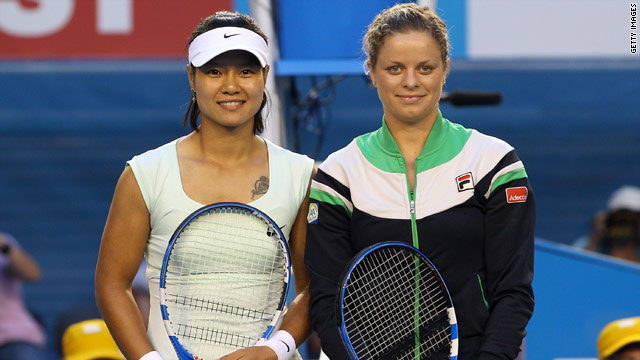Li Na: China's tennis rebel is people's idol

- Li Na the first Asian woman to play in a Grand Slam final at the Australian Open in January
- 29-year old will play defending champion Francesca Schiavone in French Open final
- She is viewed as a rebel in China, with her tattoo, different hair colors and fiery personality
Beijing (CNN) -- Li Na was hugely popular in China long before she won Saturday's French Open final, becoming the first Asian tennis player to lift a grand slam singles title.
To many Chinese, "China's number one sister" is a maverick. She has a tattoo, has dyed her hair many different colors and has even been known to yell at her husband in public.
She cemented this rebellious reputation at the 2008 Beijing Olympics by telling her own fans to "shut up" when they got too vociferous in their support during every point she played against Russia's Dinara Safina. Unfortunately this reaction did not go down too well with her supporters. "It was a very bad experience," she told CNN. "Next time I will just ask them to be quiet!"
Tattoos are controversial for many Chinese and are often associated with bad behavior. But Li is not shy in showing off the rose which adorns her chest -- she told fans it is the symbol of her love for her husband.
Li Na makes history with French Open triumph
 French Open finalist Li Na
French Open finalist Li Na
 History made at Australian Open
History made at Australian Open
 Gallery: Australian Open women's final
Gallery: Australian Open women's final
In late 2008, she quit China's tennis program and started her own team. With this new arrangement, she was able to choose her own coach and pay 8-12% of her winnings to the government compared with 65% in the past, according to Jiefang Daily, a government-run newspaper.
This means she is now responsible to her own financial security. Many in China consider this to be a very daring move for someone who has always been looked after by the Chinese sports system.
Li grew up in China's highly centralized and rigid sports program, a style adopted from the Soviet Union. The Chinese government invests heavily in sport and recruits athletes at a young age. Though this system has created a number of world champions across many sports, it is infamous for its strict management and the sacrifices athletes are expected to make.
China's eyes on Li Na's final bid
At the age of six, Li was selected to play badminton at her local sports school. Her father, himself a badminton player, was keen for her to focus on this sport until her coach introduced her to tennis -- a game he said she would enjoy if she liked being in the sun.
Unfortunately these early memories were not always positive.
"I felt sad because everyday I had to wake up early to practice before going to school," she said. "After school I had to go back to tennis again, and then after tennis I had homework. I didn't have time to play."
Roland Garros: The dark secrets of a chic tennis stadium
But Li is a late bloomer. Her career has blossomed at the age 29, which is relatively old for professional women's tennis. The new world number four also became the first Asian woman to play in a grand slam final when she lost to Kim Clijsters at the Australian Open in January.
But following her victory in Paris, her popularity in China might even exceed that of NBA superstar Yao Ming.
"I would like to play as long as I can, maybe another two or three years." she told CNN. "I like children so hopefully afterwards I can have a baby."



